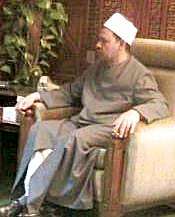Dr. Ahmad Al Tayeb, Grand Mufti of Egypt
23-sep-03, morning
 We ride to a large complex of lavish new buildings, looking much like
a school.
We are ushered to an office where we meet
Dr. Ahmad Al Tayeb, Grand Mufti of Egypt.
Dr. Al Tayeb was a professor at Al Azhar University for 1 1/2 years before
being appointed Mufti. He is considered to be a moderate; he
refused to support the Iranian fatwa against Salman Rushdie.
We ride to a large complex of lavish new buildings, looking much like
a school.
We are ushered to an office where we meet
Dr. Ahmad Al Tayeb, Grand Mufti of Egypt.
Dr. Al Tayeb was a professor at Al Azhar University for 1 1/2 years before
being appointed Mufti. He is considered to be a moderate; he
refused to support the Iranian fatwa against Salman Rushdie.
The role of the Mufti, he explains, is to provide "continuous
answers for endless questions."
He is from Luxor, where, he says, Muslims and Christians lived
together harmoniously until about 20 years ago, when "the troubles" started.
He believes that this shows that the problem with extremism is
imported.
The Mufti continues with some observations on the relationship of
Islam to other religions:
-
Many of the Prophet's followers, including his daughter, went to
a Christian country, Abyssinia, because they felt safe there during a
time of inter-Muslim conflict.
-
He cites the Koran books "The Romans" and "The Fatima", which we've heard
from before. They have much on the equivalence of the Abrahamic faiths.
-
He says
"Islam is taken from Greek Philosophy" and "Sufism is
from India."
(He did not elaborate on this fascinating assertion.)
-
In Islam, a man can marry a Christian or Jewish woman but cannot demand
that she convert. Further, he is obliged to support her worship.
A Muslim woman cannot marry a Christian or Jew because these faiths have
no similar protections.
-
In Spain, Christians, Jews, and Muslims lived in harmony. When
Christians reconquered Spain, Muslims were forced to convert or leave.
(We heard much about the benevolence and harmony of Andalusia.)
Sam asks the tough question: how can people justify the suicide
bombings even when the Koran expressly forbids it?
The Mufti evades for awhile but eventually supports this justification.
He denounces the 9/11 bombings but justifies the Palestinian bombings
as "self defense."
He also explains that
"if you arm the Palestinians to be equal with the Israeli Army,
then it would be against Islam to carry out acts like that".
(I notice that he has a lovely mother-of-pearl map of Palestine on the
wall behind him. It doesn't show Israel.)
David asks about the possibility of non-violent resistance in
Palestine.
Is there such a tradition in Islam?
The Mufti becomes animated and asks: who are you, that you preach
to us about violence,
with your Crusades and your Inquisitions?
(It is clear to us by now that he treats Christianity as a single entity.)
At this point Sam, who has been the most confrontational person in the
group, turns to us and says softly that we've gone as far as we can go
here. He is right, so after some pleasantries we leave.
This is one of the best interviews we've had, because of the Mufti's
frankness and the broad reach of the topics that he addressed.
Many of our meetings have been ceremonial or blandly conciliatory, but
the Mufti has been absolutely straightforward in expressing strong views.
It is also a sobering interview because the Mufti has a wide
reputation for moderation, yet we see his views as very hard-line.
We have also been seeing how our sense of history differs from the Arab views
that we've encountered. To us, the Crusades are ancient history with no
perceived relevance to our lives.
In the Arab world, the Crusades are a very recent event with continuing
consequences.
|